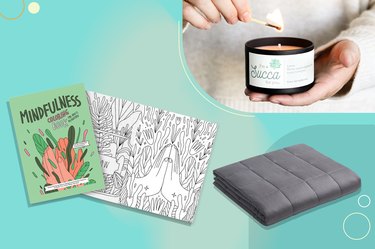
It's that time of year: where everywhere you turn, there seems to be bright, colorful lights, upbeat holiday tunes and a festive spirit in the air. It's a joyous time for many, so you might be wondering why the holidays make you feel sad or overwhelmed.
For some, the holiday season causes temporary feelings of anxiety and/or depression known as the "holiday blues." In fact, 64 percent of people say the holidays negatively affect their mental health, according to a survey by the National Alliance on Mental Illness (NAMI).
Video of the Day
Video of the Day
Here Michelle P. Maidenberg, PhD, LCSW-R, a therapist and author of ACE Your Life: Unleash Your Best Self and Live the Life You Want, explains why you might feel more anxious or depressed from Thanksgiving through New Year's, and what you can do to manage your mental health during this time and cope with the holiday blues.
Warning
If you are having thoughts of suicide, help is available. Call or text 988 for the U.S. Suicide and Crisis Lifeline, or visit your nearest emergency room. You can talk with someone who understands, and they can help you find the support you need.
So, What Are the Holiday Blues?
The holiday blues are "temporary feelings of anxiety or depression during the holidays that can be associated with extra stress, unrealistic expectations or even memories that accompany the season," per NAMI.
This is different from chronic anxiety and depression because it happens for a shorter period of time. "These anxious, depressed or sad feelings tend to crop up before Thanksgiving and dissipate after New Year's," Maidenberg says.
Some people may even feel a bit of sadness after the holidays, or post-holiday blues. Once all the holiday excitement has settled, you might be left with feelings of loss or exhaustion, according to the University of Rochester Medical Center (URMC).
Additionally, unlike chronic anxiety and depression, "holiday blues" isn't a diagnosable mental illness. In other words, it's "not a recognized psychiatric condition in the Diagnostic and Statistical Manual of Mental Disorders (DSM-5), the manual used by clinicians to diagnose mental health conditions," Maidenberg says.
That doesn't make them any less "real," of course. Nor does it mean you shouldn't seek out help if they're affecting your quality of life, even temporarily.
The holiday blues can often be confused with seasonal affective disorder (SAD) because they can both manifest around the same time of year. But the two conditions are not the same, according to the URMC.
Unlike the holiday blues, SAD is a diagnosable condition, a form of cyclical depression that happens in seasonal patterns during certain months of the year, Maidenberg says.
Most people with SAD will experience symptoms — like feeling depressed, sluggish and/or agitated — throughout the fall and winter months, not just the holidays (though, less commonly, others may feel depressed during the warmer weather).
Sometimes, you can have the holiday blues in addition to SAD, but the two don't always go hand-in-hand.
Symptoms of the Holiday Blues
For most people, the holiday blues tend to be fairly mild, but symptoms can range in severity depending on the person. Here are the most common signs to watch out for, per Maidenberg and the URMC:
- Feelings of loneliness and isolation
- Depressed, sad or irritable mood
- Difficulty focusing and concentrating
- Feelings of worthlessness
- Changes in appetite or weight
- Changes in sleep patterns (like insomnia, difficulty falling asleep or staying asleep, etc.)
- Feeling more tired than usual
- Feeling tense, worried or anxious
- Losing pleasure in doing things you used to enjoy
- Difficulty carrying out simple activities (like doing the laundry, getting out of bed, etc.)
- Drinking alcohol more often or more than usual
- Headaches
- Muscle tension
What Causes the Holiday Blues?
One of the biggest reasons for the holiday blues is stress that feels unique to the season.
For example, the holidays call for lots of socializing (think: holiday office parties, family gatherings, etc.). While celebrating with friends and loved ones can be a lot of fun, you might also feel overwhelmed about having more social obligations than normal, Maidenberg says.
Plus, with everyone in the "holiday spirit," you might feel pressure to seem joyful even when you're not particularly cheery, she adds.
A busier-than-normal social calendar also means a disruption to your routine. This could mean less sleep and exercise than you're used to, or drinking more alcohol than usual, Maidenberg says.
On top of this, environmental factors (like less sunlight during the day) can throw your body out of whack, per NAMI.
At the other end of the spectrum, you might feel lonely, isolated or sad if you spend the holidays alone, Maidenberg says. Perhaps you're missing loved ones who live far away, grieving a loss or have strained family relationships. (It doesn't help when you scroll through social media and compare your situation to others who seem happy.)
Lastly, financial stress (hello, holiday shopping) can especially put a strain on your emotions during this time of year. Many people feel pressure to give the "best" and "most expensive" gifts, thanks to the over-commercialization of the season, Maidenberg says.
This can lead to overspending and debt, which can compound your stress and holiday blues.
How to Manage the Holiday Blues
If you feel down during the holidays, it's important to take good care of yourself and prioritize your mental and physical health. Here are a few ways to beat the holiday blues, according to Maidenberg:
1. Set Up a Support System
Sometimes a heart-to-heart with a trusted friend or family member can make all the difference during this time. Communicate your needs to your loved ones so they can better support you.
It may also be helpful to identify the people who contribute to your holiday stress and set boundaries with them as needed (even if that means setting boundaries with your parents).
2. Listen to Your Body
If you begin to feel fatigue or tension throughout your body, take that as a sign: You need to slow down.
Find moments in the busy-ness to practice mindfulness, either with a guided meditation, gentle stretching and yoga, a massage or even just a nap.
3. Be Flexible With Your Plans
While you may be used to celebrating the holidays in a specific way, it's OK to try something different.
For example, instead of cooking every holiday meal, maybe pre-order some dishes from a local restaurant to cut down on the stress of preparing everything yourself.
Put another way: Be open-minded to implementing new traditions for the sake of your mental health.
4. Try Volunteering
The holiday season is also known as the "season of giving" for a reason. Try spending time at your local soup kitchen handing out hot meals, or volunteer at your local animal shelter.
Helping others may not only alleviate feelings of loneliness and isolation, but it can also give you a renewed sense of purpose.
5. Don’t Suppress Your Sadness
Remind yourself it's OK to feel sad during the holidays. Your feelings are valid, especially if the holidays bring up painful memories, grief or other hardships.
Rather than stuffing it all down, acknowledge your emotions, then take time to practice gratitude and celebrate life however best suits you.
If you're grieving a lost loved one, you might consider them in this celebration: Maybe you bake their favorite holiday dessert using their recipe, do an activity you used to enjoy together or write them a letter of gratitude.
Can You Prevent the Holiday Blues?
If you notice a pattern of anxiety or depression that develops during the holiday season, there are things you can do to prepare ahead of time, hopefully keeping these blues at bay.
Try some of these strategies to prioritize self-care during the holidays, per NAMI and Maidenberg:
1. Get Enough Sleep
When you don't get enough rest, you may find it more challenging to regulate your emotions, which can make you more prone to a depressive mood, according to Johns Hopkins Medicine.
No matter the time of year, try to get seven to nine hours of sleep each night, per the National Heart, Lung and Blood Institute.
2. Take Time for Yourself, but Don't Isolate
Try to find a balance between recharging with some quality time to yourself and socializing with those who ease your stress levels.
When you do have your alone time, find ways to relax like listening to music or podcasts, journaling, reading, exercising or spending time in nature.
3. Enjoy Holiday Treats in Moderation
Of course, it's important to eat the holiday treats that make you happy. But make sure to eat and drink mindfully — that is, savoring your food so you feel satisfied without overdoing it.
Beyond the treats, try filling the majority of your meals with nutritious foods like fruit, veggies, whole grains, healthy fats and lean protein, which will help support better energy levels, mood and sleep, according to the Centre for Addiction and Mental Health.
4. Move More
Try to exercise regularly during the holiday season, even if this means taking a short walk around your neighborhood. Physical activity helps increase your production of feel-good hormones called endorphins, while reducing stress hormones like adrenaline and cortisol, according to Harvard Health Publishing.
5. Make 'To-Do' Lists
List out and prioritize the most important holiday activities. Either remove or share the responsibilities of the less-important tasks.
Not only will this help minimize holiday stress, but it can make tasks during this time seem much more doable. It can also help you be realistic about what you can and can't do during this time (i.e., cooking for the entire family, shopping, attending parties, etc.).
6. Set a Budget
Decide what you're going to spend on holiday shopping ahead of time. This will help ensure you don't overextend yourself and spend more than you can afford, limiting financial stress in the process.
When to See a Mental Health Professional
The holiday blues are fairly common, and in most cases they're a short-term issue. Still, it's important to take your mental health seriously, so the blues don't turn into something more serious.
"While the holiday blues are not a clinical diagnosis, the stress, anxiety and sadness of the season can contribute to more long-term conditions, especially for people with preexisting mental illness," Maidenberg says.
If the holiday season passes, and you're still feeling depressed or anxious, Maidenberg recommends reaching out to a therapist. They can help you determine if you're dealing with something like SAD, which could require longer-term therapy or medication.
If you're having thoughts of suicide or self-harm, reach out for help immediately. You can call or text 988, the Suicide and Crisis Lifeline, or go to the nearest emergency room.
- National Alliance on Mental Illness: “Tips for Managing the Holiday Blues”
- University of Rochester Medical Center: “Help for the Holiday Blues”
- Centre for Addiction and Mental Health: “You’ve heard of the winter blues but what about summer depression?”
- Johns Hopkins Medicine: " Depression and Sleep: Understanding the Connection”
- National Heart, Lung and Blood Institute: “How Much Sleep Is Enough?”
- Harvard Health Publishing: "Exercising to relax"
Is this an emergency? If you are experiencing serious medical symptoms, please see the National Library of Medicine’s list of signs you need emergency medical attention or call 911.



